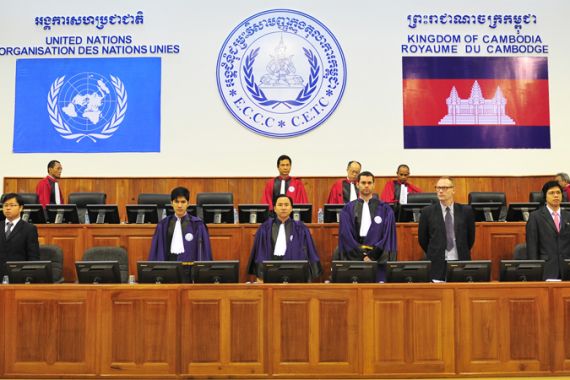UN gets loan to pay Khmer Rouge court staff
Cambodian employees of cash-strapped court who were on strike over unpaid wages expected to return to work on Thursday.

The United Nations says it has secured a loan to pay Cambodian employees at the cash-strapped Khmer Rouge war crimes court who are striking over unpaid wages.
The UN-backed tribunal’s 250 local workers, including judges and prosecutors, have not been paid since June because of a cash shortage. Most of them have been on strike since September 1.
UN spokesman Lars Olsen said in an emailed statement on Wednesday that the world body had successfully worked with major donors to secure their authorisation to make a further loan to the Cambodian side of the court for “the payment of arrears of national salaries”.
Olsen said the loan to the Extraordinary Chambers in the Courts of Cambodia (ECCC) was being made on a strictly reimbursable basis. “We hope that the national staff of the ECCC will now be able to return to work on this basis,” he said.
Staff to return
The UN also called on Cambodia to “meet its obligation” to pay salaries for the national staff. “Any further strikes could risk delaying the judicial proceedings and jeopardise the court’s ability to function,” Olsen added. Neth Pheaktra, a Cambodian spokesman at the tribunal, said the striking staff were expected to return to work on Thursday.
The hybrid court has been frequently short of cash since it was set up in 2006 to seek justice for the deaths of up to two million people under the brutal communist Khmer Rouge regime in the late 1970s.
The UN pays for the international workers while the salaries of the local staff are the responsibility of the Cambodian government, with both sides relying on donors. The court was forced to suspend proceedings for about two weeks in March due to a strike over unpaid wages.
Two defendants — “Brother Number Two” Nuon Chea, 87, and former head of state Khieu Samphan, 82 — are on trial for war crimes, genocide and crimes against humanity. The court is currently in recess and preparing to hear closing statements in the first part of the trial in mid-October.
Led by Pol Pot, who died in 1998, the Khmer Rouge wiped out nearly a quarter of Cambodia’s population through starvation, overwork or execution in a bid to create an agrarian utopia. So far the UN-backed court has achieved one conviction, sentencing a former prison chief to life in jail for overseeing the deaths of 15,000 people.